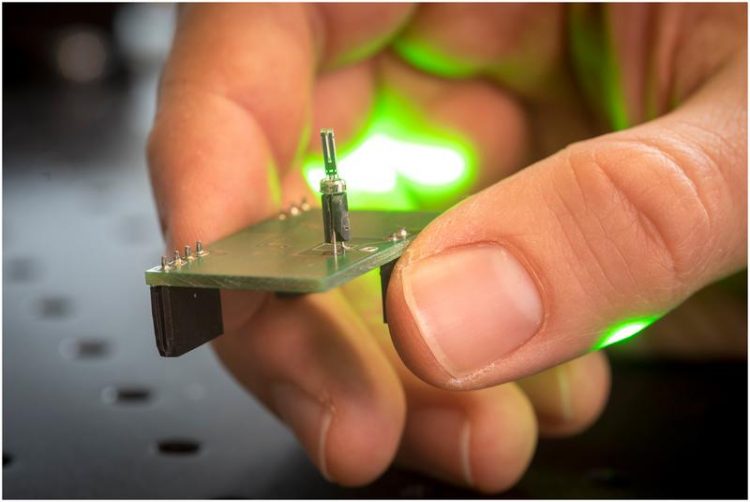Vehicle Emissions: New sensor technology to improve air quality in cities

At the Institute for Electronic Sensor Systems a tuning fork was developed, which can measure air compositions © Lunghammer – TU Graz
Today, air pollution is one of the biggest challenges facing European cities. As part of the Horizon 2020 research project CARES (City Air Remote Emission Sensing), an international research consortium is working on new contactless exhaust measurement methods that will enable municipalities to take emission-reducing measures.
In concrete terms, the researchers want to develop new sensors that can be attached to roadsides, crash barriers or traffic signs which detect the exhaust emission of passing vehicles in a matter of seconds.
“We want to monitor vehicle emissions in cities and environmental zones under real conditions, without having to interfere with free-flowing traffic,” explains Alexander Bergmann, head of the Institute of Electronic Sensor Systems at Graz University of Technology. He and his team are primarily responsible in the project for all aspects of particle measurement – a field in which the Institute is one of the world’s leading institutions.
Manifold possibilities of traffic regulation
“The aim is to detect the exhaust class of each individual vehicle using these measurements,” explains Bergmann. For example, cities could introduce an emissions-based city toll: the higher the emissions of the car, the higher the charge would be. Entry permits into environmental zones could also be monitored automatically, in which automatic barriers only open if the pollutant emissions of the approaching car are within the standard range.
Finally, sensor technology could be used to identify and pull out of traffic those vehicles in which engine performance and thus pollutant emissions have been increased with manipulated particle filters or chip tuning.
Tuning forks as particle measurers
Bergmann expects low-cost remote sensors for emission measurement to be ready for series production by the end of the 2022 project at the latest. However, he already refers to the first promising tests at the institute in which conventional tuning forks are used.
The particles between the fork are excited through laser pulses, which in turn produce an acoustic signal and begin to “sing” in the truest sense of the word. Each individual particle emits acoustic signals which are recorded and played back by the tuning fork. The more particles there are, the louder the sound becomes. The volume can then be used to determine how many particles are in the environment.
The technology is already being used successfully for gas measurements. “Our institute was now able to show for the first time that this also works with particles and could be a possibility for a low-cost sensor,” said Bergmann. The researchers at TU Graz hope that the measuring method will also prove its worth in the metropolises of Milan, Prague and Krakow, where the investigations will be carried out in live operation as part of the CARES project.
The research project CARES is funded within the Horizon 2020 Research and Innovation Programme of the European Union with EUR 3,326,735.50 and is anchored in the Field of Expertise “Information, Communication & Computing”, one of five strategic focal areas of Graz University of Technology.
Cooperation partners
– Ivl Svenska Miljoeinstitutet (Leadpartner; SE)
– TU Graz (Institute of Electronic Sensor Systems; Institute of Internal Combustion Engines and Thermodynamics; AT)
– Airyx Gmbh (DE)
– AMAT (Agenzia Mobilita' Ambiente E Territorio; IT)
– AUTh (Aristotle University of Thessaloniki; GR)
– CTU (Czech Technical University in Prague; CZ)
– CULS (Czech University of Life Sciences Prague; CZ)
– EMPA (Swiss Federal Laboratories for Materials Science and Technology; CH)
– ICCT (International Council on Clean Transportation; DE)
– IIASA (International Institute for Applied Systems Analysis; AT)
– Innovhub – Stazioni Sperimentali Per L'industria (IT)
– Krakowski Alarm Smogowy (PL)
– TNO (Dutch Organisation for Applied Scientific Research; NL)
– University of Heidelberg (DE)
– University Of Leeds (GB)
– University Of York (GB)
Alexander BERGMANN
Univ.-Prof. Mag.rer.nat. Dr.rer.nat.
TU Graz | Institute of Electronic Sensor Systems
Tel.: +43 316 873 3340
alexander.bergmann@tugraz.at
ies.tugraz.at
https://trimis.ec.europa.eu/project/city-air-remote-emission-sensing#tab-outline (project data)
Media Contact
All latest news from the category: Power and Electrical Engineering
This topic covers issues related to energy generation, conversion, transportation and consumption and how the industry is addressing the challenge of energy efficiency in general.
innovations-report provides in-depth and informative reports and articles on subjects ranging from wind energy, fuel cell technology, solar energy, geothermal energy, petroleum, gas, nuclear engineering, alternative energy and energy efficiency to fusion, hydrogen and superconductor technologies.
Newest articles
Faster, more energy-efficient way to manufacture an industrially important chemical
Zirconium combined with silicon nitride enhances the conversion of propane — present in natural gas — needed to create in-demand plastic, polypropylene. Polypropylene is a common type of plastic found…

Energy planning in Ghana as a role model for the world
Improving the resilience of energy systems in the Global South. What criteria should we use to better plan for resilient energy systems? How do socio-economic, technical and climate change related…

Artificial blood vessels could improve heart bypass outcomes
Artificial blood vessels could improve heart bypass outcomes. 3D-printed blood vessels, which closely mimic the properties of human veins, could transform the treatment of cardiovascular diseases. Strong, flexible, gel-like tubes…





















